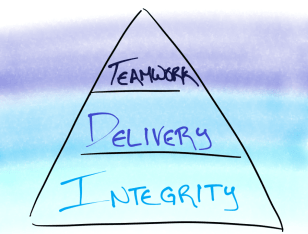I joined my team a few months ago. I’ve done a few projects and had time to integrate into the team culture. But I’m still having a hard time getting buy-in for my ideas and I don’t feel included in the decision-making process. What do I do?”
Building trust is key to having impact at any company. Whether you’re a researcher, product manager, engineer, or designer — you need to have trust to influence decision-making.
Often times, in tech, we focus on the quality of our work above all else. We think that if we can just produce enough work, at high enough quality, surely our teams will begin to trust us with larger, more ambiguous problem spaces. Right?
Well, it’s not that simple. Yes, doing quality work is important. But it’s not enough to just execute skillfully. You need to make sure that you have strong relationships with your teammates so that they can see the full value you bring to the table. These relationships come from doing the right thing, delivering valuable work, and being a good teammate. Together, these three values form the pyramid of trust.
- Integrity – Do the right thing
- Delivery – Deliver valuable work
- Teamwork – Be a good teammate

The pyramid of Trust. Integrity forms the foundation of the pyramid. You can’t have trust without it. Delivery and Teamwork help build and grow strong relationships.
Integrity
Integrity is the foundation of trust. You can do the highest quality of work, but if you are dishonest, violate your promises, or lack ethics – no one is going to trust you.
The first thing I recommend to anyone struggling to build trust is to run a diagnostic on yourself. Are you doing anything that could be degrading trust? What can you do to strengthen your foundation and show your partners that you are worthy of their trust?
- Stick to your promises – Your teammates need to know that they can trust you to do what you say you will. If you make a promise, keep it. But be careful about what promises you make. If you don’t know if you can do something, say that! It’s better to be honest and right then it is to overpromise and underdeliver.
- Be honest, direct, & transparent – Lying, withholding the truth, talking about people behind their back? Those are all great ways to burn trust. Being honest & direct takes bravery. It’s hard! But it’s also integral to earning the respect of the people you work with.
- Stand up for what is right – I’ve been lucky to work in cultures where standing up for your beliefs is rewarded. I know this isn’t true everywhere. But do you want to work with people who fold in the face of pressure and abandon their beliefs? Me neither. If you see something that feels wrong, speak up. We need more leaders in our industry who are willing to go against the grain and do what’s right.
Delivery
The next step is to take a hard look at the work you are doing. You can’t be part of the decision-making process if you aren’t bringing any value to the table. Often times, people struggling to build trust focus only on the fact that they have delivered work and don’t think more critically about how that work is landing with their partners. Delivering valuable work means doing quality work, finishing on time, and making a difference.
- Quality work – We all have a role to play at our company, based on some set of skills. It’s important to be good at those skills. For those of us in insights, this is about bringing the right level of rigor to our work, interpreting the data correctly, and ensuring we explain any validity concerns or caveats to our findings. But more generally, this is about making sure your work is peer-reviewed, meets craft standards for your discipline, and is free of any errors or issues that could undermine your work.
- Deliver on time – Quality work means little if you don’t deliver to stakeholders in time to influence a decision. I want to stress here that quality is always more important than meeting an arbitrary deadline. If you deliver shoddy work on time, no one is going to trust you. But if you can’t meet a deadline, consider down-scoping, asking for help, or asking for an extension. The earlier and more frequently you communicate, the more involved your team can be in any changes to the plan. This is where having a reputation for being honest and direct can come into play. If your team knows you are honest and open about your circumstances, they are more likely to understand any delays.
- Focus on Impact – It’s not enough to do quality, timely work. You can make a really pretty presentation based on a fantastic analysis. But if it doesn’t help your team make decisions, then no one is going to care. There are many parts to impact: answering the right question, delivering insights (not just a collection of facts), and working with your team to act on the findings. Each of these could be its own post. But at a minimum, ask yourself what has changed as a result of your work. If you’re having impact, you should be able to point to specific outcomes that wouldn’t have happened without you.
Teamwork
As a final step, think about how you can give back to your team. Teamwork is the single most overlooked element in the trust-building process. Being a good team member is about going above and beyond your needs to focus on the needs of your team. That’s it. It’s pretty simple. But it also means spending time on things that aren’t directly related to “your work.”
- Show you care – If you take one thing away from this article, be it this: Listen. Listen to the people you work with. Then show them you are listening. Acknowledge their position. Repeat back what you are hearing to show you understand. Support your partners when you agree with them (especially if they are being brave by standing up for what’s right!) When I am struggling to build trust with an individual, the first thing I do is take them out to coffee. Then I ask how they are feeling about the problem we are working on. Then I listen. We so rarely take the time just to understand someone else’s situation. Taking the time to show you care can literally flip a relationship in a matter of minutes.
- Help them succeed – This ties back to having impact, but goes one step further. When you join a new team, make sure you understand what is important to your teammates. Sometimes your partners have different objectives or are incentivized differently than you. Sometimes you come into a team with incomplete information. Take the time to understand the goals of your teammates. Then find ways to help them succeed. Maybe this means proposing solutions to problems that help everyone “win.” Maybe this means giving positive feedback to a teammate’s manager when they are doing good work. Or maybe means working on something outside of your core responsibilities. Whatever it is, investing in others can be both deeply rewarding and is a great way to strengthen your relationships.
- Be easy to work with – I can’t overstate how important professionalism and kindness are in the workplace. Maybe people put up with the brilliant asshole, but no one wants to work with them. Be nice to other people. Don’t be a jerk. Don’t interrupt people, back them into a corner, or put people down. Extend compassion to people you don’t understand and assume that they are trying to do a good job, just like you. And be approachable! If you are good at your job– people might be intimidated by you, even if you find this hard to believe. Reach out to the people around you to let them know how you can help. Show them you are there for them.
Putting it all together
Strong, trusting relationships are critical for impacting decision-making and growing the scope of your role. The next time you are having trouble getting buy-in from your team, ask yourself: am I doing the right thing, delivering valuable work, and being a good teammate? Talk to your teammates to understand where you can improve and what they need most from you.
Have a specific trust challenge you need help with? Want to learn more about any of the topics covered in this post? Comment below or message @tiny_data_tech and I may feature it in an upcoming post!
Genevieve Conley Gambill is a strategic adviser and UX researcher with ten years of experience in entertainment and technology. Her blog, tiny-data.tech, is dedicated to doing good with data and making tech a better place for all.
Photo by Helena Lopes on Unsplash




2 Comments